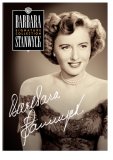| Reviews & Columns |
|
Reviews DVD TV on DVD Blu-ray 4K UHD International DVDs In Theaters Reviews by Studio Video Games Features Collector Series DVDs Easter Egg Database Interviews DVD Talk Radio Feature Articles Columns Anime Talk DVD Savant Horror DVDs The M.O.D. Squad Art House HD Talk Silent DVD
|
DVD Talk Forum |
|
|
| Resources |
|
DVD Price Search Customer Service #'s RCE Info Links |
|
Columns
|
|
|
Barbara Stanwyck - The Signature Collection
THE MOVIES:
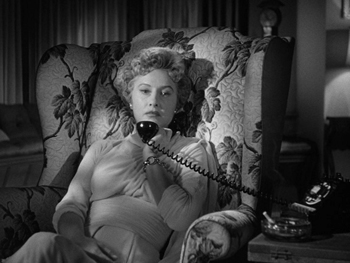
Though Barbara Stanwyck is one of Hollywood's most enduring stars, she isn't usually one of the first listed amongst the icons of the Golden Age. She didn't have the style of Audrey Hepburn or the va-va-voom mystique of Marilyn Monroe, or even the camp factor that has saved Joan Crawford from a similar fate. It seems to me that Barbara Stanwyck is more of the actor's actress, a respected figure fiercely protected by cinema buffs who recognize that, in this case, talent supercedes image.
Stanwyck was not conventionally beautiful, at least not in the sense of being a pin-up figure. Lovely, is perhaps a better word. Handsome, even. She was more sensual than sexual. This was a trait that worked in her favor when it came to the variety of roles she played. As intelligent as Katharine Hepburn, she wasn't restrained by Hepburn's voice or tied down by so singular a personality. The fact that it's easier to pin down what Barbara Stanwyck wasn't than it is to fit her into any particular mold is perhaps why she was so able to morph into various characters. Equally at home in dramas and comedies, Stanwyck could be the femme fatale, either as wicked and conniving (Double Indemnity) or the wisecracking dame whose tough shell shielded her from the outside world (The Lady Eve). The fact that she was so believable in either category made any third-act transformation all the more remarkable. The petty thief in Remember the Night who melts into Fred MacMurray's arms in the final reel manages a much heftier tug on the audience's heartstrings because the change is so great. Likewise, that vulnerability that made it so convincing when she fell in love also made it all the more painful when she was heartbroken, such as the emotionally stranded heiress she played in Executive Suite, the lead movie in this set. An independent spirit admitting that she needs others to be happy requires a special kind of compassion.
The new boxed set, Barbara Stanwyck - The Signature Collection, brings together six movies on five DVDs, showcasing the range of Barbara Stanwyck's career by featuring her in a variety of roles. Victim, aggressor, lover, performer--it's all here. In each role, though Stanwyck submits to the needs of the character, she consistently maintains the inner strength that made her so confident stepping into others' shoes and that kept her working for the rest of her life when others saw their stars dim.
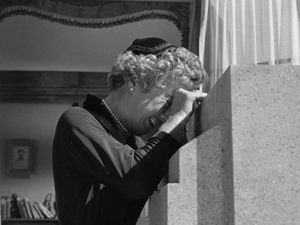
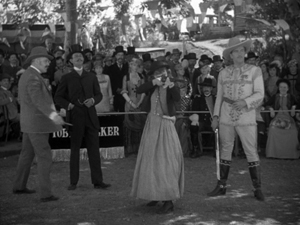
(left to right) Executive Suite; Annie Oakley
Executive Suite (1953; 104 minutes): This Robert Wise-directed drama of big business is more of an ensemble piece than it is a vehicle for Barbara Stanwyck. In fact, of the lead players, she probably gets the least amount of screen time. Yet, as the jilted heiress to the Tredway Furniture fortune, the actress has the most impact. While all the men are jockeying for power, only Julia Tredway remembers that the empty chair at the head of the boardroom table is empty because a man died. The head of the company, who took over when her own father passed away, took over Julia's heart at the same time. The way he eventually cast it aside, however, provides the cautionary tale that will remind William Holden that a business is not just about dollars and cents, but about the people who move the company forward.
The list of behind-the-scenes architects on Executive Suite is an impressive who's who of Hollywood innovators. In addition to Wise, the movie had John Houseman (They Live By Night) as producer and Ernest Lehman (Sabrina, North by Northwest) on script duties, so it's no wonder that it still feels fresh and original over fifty years later. Essentially the Wall Street equivalent of an action picture, the movie's plot involves six men trying to reconfigure their company when the big boss keels over dead. (The opening scenes, shot entirely from the soon-to-be dead man's point of view, make for an unforgettable lead-in.) Eventually, two main candidates emerge to take over: the young product developer Don Walling (Holden) and the cold accountant Loren Shaw (Fredric March). The men must rush to secure their position and secure the votes of the other five board members, of which Julia is the swing vote. Suspenseful without any threat to life and exciting despite no punch ever being thrown, Executive Suite is boardroom drama at its very best.
Stanwyck gives an outstanding performance in the film, portraying the pain of all that Julia has lost with a heartbreaking sadness and a palpable bitterness. The death of the man who was supposed to be her lover forces her finally to mourn the years that she has given up waiting for him, and her tears have as much rage in them as they do grief. Her best scene, however, comes in the climax, where the actress doesn't even speak a line. As Holden makes a grandstanding plea to the board (and does so with great charisma), Stanwyck only watches and listens, the sway his words have over her playing out on her face. She barely moves a muscle, and yet we see it all.
Annie Oakley (1935; 90 minutes): This much earlier starring vehicle for Stanwyck is like a backwoods A Star is Born, with Barbara playing "Little Sure Shot," the riflelady that joined Buffalo Bill's traveling show in the early part of the century and made a name with her dead-on aim. Directed by George Stevens, this Annie Oakley is the hokum version of the story, fixed up for the movies in order to hit as many emotional chords as it can and fill seats.
Young Annie hunts quail to earn money for her family and earns a reputation for her clean shots. A misunderstanding puts her in a shooting match with trick gunman Toby Walker (Preston Foster) and garners the attention of Buffalo Bill's recruiter, Jeff Hogarth (Melvyn Douglas). Annie joins the show, begins to rival the preening Walker, and then eventually falls in love with him. A heroic accident--Toby saves Sitting Bull (Chief Thunderbird) from Indian haters, though someone should have saved all of these Native American actors (and the African American ones, too) from this picture--hurts Toby's eyes and his pride. This gives Hogarth his chance to move in, as well as setting George Stevens up for a three-hankie ending. For as cheesy as the last scene is, you have to give these old films credit, because it still works. For as much as you start out laughing at a silly film like Annie Oakley, it's hard not to be completely invested by the time the ending rolls around.
A lot of credit for that has to be given to Barbara Stanwyck. She is so very charming as the deceptively naïve young Annie, able to stifle her own pride in order to look out for the fragile ego of her peacock boyfriend. Even as her confidence grows, she manages to hold on to that girlish quality, a strength that is partially bolstered by a genuine small-town innocence. Yet, we also see hints of the Stanwyck that can joke around with the guys. Her performance is a complete portrait of the real woman, even if the story itself is more like a cartoon.
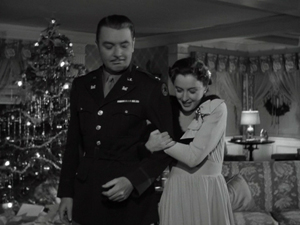
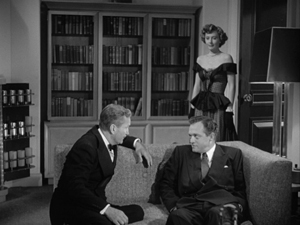
My Reputation; East Side, West Side
My Reputation (1946; 94 minutes): The newly widowed Jessica Drummond (Stanwyck) has to contend with getting on with her life while raising two children in an affluent neighborhood near Chicago. Formerly part of a gossipy coffee klatch of well-to-do housewives, Jessica finds herself on the other side of the story when a love affair with a dashing Army major (George Brent) becomes the topic of conversation at the holiday parties. Persecuted by an overbearing mother (Lucile Watson), and guilt-ridden about what she sees as her responsibilities as a mother, Jessica must learn to get past worrying about others and start following her own heart--something her best friend (the always wondrous Eve Arden) has been encouraging, and just the sort of lesson a rootless soldier can provide an excellent example of. That is if his duty and World War II don't get in the way.
A sophisticated melodrama directed by German ex-pat Curtis Bernhardt (Possessed) and written by Catherine Turney (Of Human Bondage), My Reputation quickly became one of my favorites out of the Barbara Stanwyck Signature Collection. The actress is at her most vulnerable here, constantly torn between what she thinks is right and desires for herself versus what others assume is the only proper action for her. She has the tragic forbearance of a mother and wife is who used to taking care of others, but the fragile demeanor of a woman who has lost all of her support. It's one of those movies where the heroine has to seemingly grow stronger scene by scene, even though social obstacles continually knock her back. Stanwyck doesn't rely on any of the brassy attitude that was so integral to many of her more famous roles. You would swear she was a Midwestern family woman when not being a Hollywood superstar!
East Side, West Side (1949; 108 minutes): Another immediate candidate for favorite status is East Side, West Side. Barbara Stanwyck stars as Jessie Bourne, a New York socialite married to a philanderer (James Mason) attempting to reform. He's been doing an okay job of it, but only because his main temptation (Ava Gardner) has been out of the city. When Isabel returns, Brandon falls into his old ways, nearly pushing his wife into the arms of the do-gooder government man who has returned to his home city after a spate of humanitarian work overseas. Mark (Van Heflin) immediately takes a shine to Jessie, and he also sees right away that she's in a bad situation.
As with many of the Stanwyck roles featured on movies in this box, Jessie is a character caught in between. She knows what she needs to be happy, but she can't let go of the love she has for her husband. Better to forgive his sins than to lose him. James Mason plays the cad quite well, and he makes great work of Brandon's explanations that his dalliances are like an addiction he can't shake. Ava Gardner is also quite good as the vicious seductress, as is a young Cyd Charisse as the bubbly neighborhood girl with a crush on the square-jawed Van Heflin. It's Stanwyck's show all the way, though, and after the film takes a turn from societal drama into mystery, it's time for her to twist up her courage and pack her bags.
Keep your eyes peeled, too. I completely missed that Jessie's best friend, Helen, was played by Nancy Davis--the future Mrs. Reagan
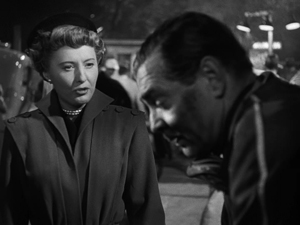
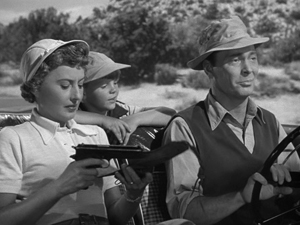
To Please a Lady; Jeopardy
The last disc in the set is a double feature, much like the double-ups in Warners' most recent film noir box.
To Please a Lady (1950; 91 minutes): Clarence Brown (Anna Karenina) directs what may be the ultimate date picture. It's got enough melodrama to keep the ladies panting heavily, and enough car racing to keep the guys happy in between make-out sessions. Barbara Stanwyck plays Regina Forbes, a gossip columnist with a vicious streak. After seeing the reckless driving of racer Mike Brannan (Clark Gable), whose win results in another speedster's death, she makes it her personal vendetta to ruin his career. Reduced to performing stunts in a traveling auto circus, Mike climbs his way back, rejoining legitimate racing. In the process, he stands up to Regina and wins her heart with his macho bravado. Such are the perks of being Clark Gable!
What sets To Please a Lady apart from your average bodice ripper are the very credible and often exciting car racing scenes and also the heavier load borne by the regular thematic element of a "woman's picture," wondering just how much you'll sacrifice to have personal success instead of love. In this case, Brown and screenwriters Barre Lyndon and Marge Decker draw parallels between the disregard for life that Regina sees Mike engage in on the racetrack and her unrelenting pursuit of a story. Ruining a man's career, as it turns out, can have just as much of an impact as causing him to drive into a wall.
To be honest, To Please a Lady doesn't deal with that grave issue to an entirely satisfactory end. The thrills of Gable pushing his roadster to the limit supercede the need for any serious discussion. He and Stanwyck make such a good pair, however, that it doesn't really matter. The self-confident and pigheaded Regina meets her match when she crosses paths with the self-confident and pigheaded Mike, and the actors playing the roles each have poise to spare. It takes an assured woman to go toe-to-toe with Gable, and Stanwyck is up to the challenge. Their competitive chemistry reminded me of Hepburn and Tracy.
Jeopardy (1953; 69 minutes): This tightly wound little thriller from John Sturges (Bad Day at Black Rock, Mystery Street) is all killer, no filler. Think along the lines of an awesome episode of Alfred Hitchcock Presents, but a little bit better.
Stanwyck plays Helen Stilwin, an average housewife on vacation in Mexico with her ex-Army husband (Barry Sullivan) and son (Lee Aaker). We know from the title and from Stanwyck's voiceover narration that this is not going to be an ordinary vacation, and Sturges and screenwriter Mel Dinelli (The Spiral Staircase) load the first twenty minutes with all kinds of red herring details to put us on the edges of our seats wondering just what kind of jeopardy Helen is going to get into. Once the film settles into its second half and the plot begins its proper trajectory, it's a straight rush through a host of twists and turns.
Jeopardy is a nail-biter, and Stanwyck plays a meek woman pushed to make some tough choices. She asks herself what lengths she would go to in order to protect her family, and she answers with a trembling bravery. It's a great performance, and I was hypnotized from start to finish.
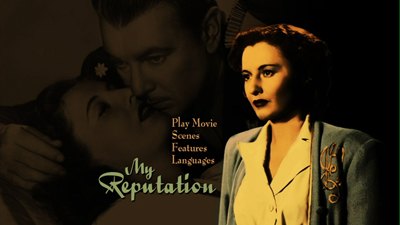
THE DVD
Video:
All of the movies in the Barbara Stanwyck Signature Collection are full frame, and for the most part, they all look pretty good. These aren't necessarily full restoration jobs like we might see on a more heralded release, but the resolution and overall image quality on all the films are solid, with some being worse off than others. Annie Oakley, for instance, has a lot of instances of dirt and surface noise, as well as fuzziness in some of the fades. There are also many instances of skips in the film, like a couple of frames were missing or two takes were spliced together when the picture was being edited. Having never seen it before, I have no reference point to say if this is just the way the film is put together or what. It is the oldest in the Signature Collection, after all.
Of the others, it's East Side, West Side that seems to have the most regular cases of cracks and pops on the image. There is a weird hiccup in chapter 9 where the picture freezes before cutting really fast to another shot within the same scene, and the sound drops out for a second. There is also a bit of audio hiss in chapter 18 for about thirty seconds.
It should also be noted that though Executive Suite is presented at 1.33:1 here, the film was actually shot at 1.66:1. So, the claim on the DVD box that Executive Suite is being presented in its original aspect ratio is false.
Sound:
Pretty standard stereo mixes service these movies fine. No fancy mixing tricks, but also no sound problems either. Surface noise has been removed. The films also get English and French subtitles, as well as Closed Captioning.
Extras:
There is a uniformity to these discs that mirrors other Warner Bros.' classic releases. Each film has both a live action short and a vintage cartoon, usually from the year that the movie was released, to simulate a night out at the movies. These bonuses are as follows, with the live action being listed first and the cartoon second:
* Executive Suite: "Out for Fun," a Pete Smith comedy; "Billy Boy," a Tex Avery cartoon from his tenure at the MGM studio, featuring his slow-moving Southern wolf and a voraciously hungry billy goat.
* Annie Oakley: "Main Street Follies" musical short; "Into Your Dance," a Friz Freleng-directed Merrie Melodie.
* My Reputation: "John Savitt and his Band" musical short; "Daffy Doodles" cartoon, in which Daffy Duck gets his jollies drawing moustaches on things.
* East Side, West Side: "Stuff for Stuff," an animation-heavy news short about free trade from the Passing Parade series; "Counterfeit Cat," another Tex Avery MGM short, this time with a cat pretending to be a dog to try to get inside a house with a caged bird.
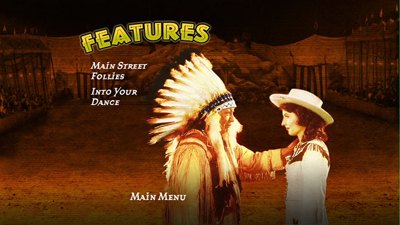
The one exception to this formula is the double-feature disc, which instead of these shorts has the radio adaptation of Jeopardy, featuring the original cast. My Reputation also has radio programs, two different adaptations of the movie. One of them stars Barbara Stanwyck, the other replaces her with Alexis Smith and George Brent with Wayne Morris.
The only feature to have an audio commentary is Executive Suite and it's by contemporary film director Oliver Stone. On the track, he covers his appreciation for the film and the influence it had on him, particularly in making Wall Street. He discusses the quality of the filmmaking and the social aspects of the story, where America was back then and the changes Executive Suite was foreshadowing. It sounds like this track was recorded some time ago, as Stone mentions Gosford Park as having come out only a couple of years before. Whether that's just bad memory shorting time or not, I don't know. There are no other time-specific references. (He does compare the dead boss to Alexander the Great, but does not mention his own movie Alexander, so again....) There are several gaps in the talk, but otherwise it is pretty interesting.
Most of the movies have their original theatrical trailers, except for Annie Oakley.
The DVDs are packaged in regular plastic cases and they come in the standard Signature Collection cardboard box.
FINAL THOUGHTS:
Highly Recommended. The Barbara Stanwyck Signature Collection is another fantastic compilation culled from the Warner Bros. catalogue. Being familiar with hardly any of these movies, I was expecting a bunch of second-stringers, but that is far from the case. Of the six movies on these five DVDs, there is only one semi-clunker, the poorly aged Annie Oakley, but even it has a sort of hayseed charm. Of the others, Executive Suite is a bonafide classic, My Reputation and East Side, West Side are surprisingly potent melodramas, and Jeopardy is a harrowing latter-day noir that packs as many thrills as a top-of-the-line Hitchcock romp. When you're through, you'll wonder why Barbara Stanwyck isn't a more regularly heralded actress. She was a unique star amongst the old studio system, at home with the guys but definitely one of the ladies. Intelligent, vulnerable, tough, and funny, she had it all.
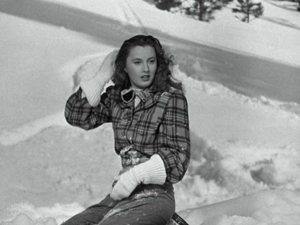
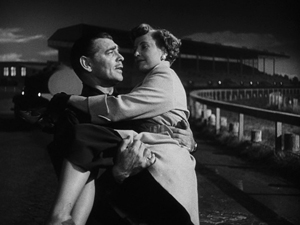
Jamie S. Rich is a novelist and comic book writer. He is best known for his collaborations with Joelle Jones, including the hardboiled crime comic book You Have Killed Me, the challenging romance 12 Reasons Why I Love Her, and the 2007 prose novel Have You Seen the Horizon Lately?, for which Jones did the cover. All three were published by Oni Press. His most recent projects include the futuristic romance A Boy and a Girl with Natalie Nourigat; Archer Coe and the Thousand Natural Shocks, a loopy crime tale drawn by Dan Christensen; and the horror miniseries Madame Frankenstein, a collaboration with Megan Levens. Follow Rich's blog at Confessions123.com.
|
| Popular Reviews |
| Sponsored Links |
|
|
| Sponsored Links |
|
|
| Release List | Reviews | Shop | Newsletter | Forum | DVD Giveaways | Blu-Ray | Advertise |
|
Copyright 2024 DVDTalk.com All Rights Reserved. Legal Info, Privacy Policy, Terms of Use,
Manage Preferences,
Your Privacy Choices | |||||||









